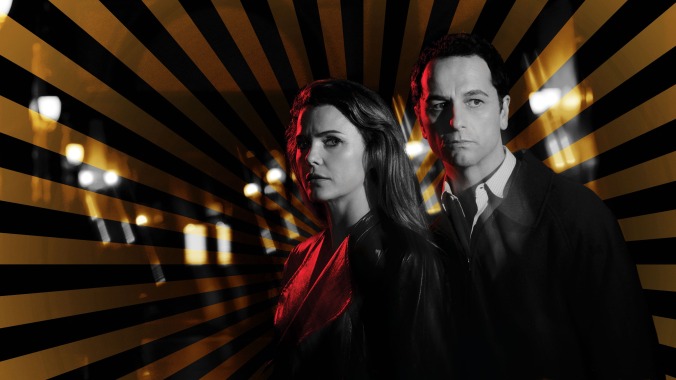The Americans showrunners have a few topics they really don’t want to discuss
Image: Photo: Pari DukovicGraphic: Rebecca Fassola
[Note: This post discusses plot points for the series finale of The Americans.]
The Americans has assassinated its final agent and hosted its last family dinner. It was a stirring conclusion—Philip and Elizabeth forced to flee the U.S. back to their homeland, Stan confronted with the proof of his best friend’s deception, and the kids remaining on American soil—which allowed the series to provide a moving reflection on many of the key themes it has addressed over the years. Thanks to a scheduling snafu, The A.V. Club only had a few minutes to check in with showrunners Joe Weisberg and Joel Fields and look back over the course of the show. But they spoke openly about certain decisions, remained stubbornly tight-lipped on others, and as for the lingering question of whether Renee is indeed a Russian spy—well, you can see for yourself the degree of their eagerness to clear up that little mystery.
The A.V. Club: When we spoke to you a few months ago, you mentioned how you actually ended up sticking with the original ending you had envisioned from the very start. Was that concept just Philip and Elizabeth returning to Russia, or were there other parts of the finale included in that original idea?
Joe Weisberg: That was the whole original ending. We didn’t know if they’d go back with one kid, both kids, no kid, but that was the original idea. Everything else you see in that ending we did not have.
AVC: Which is interesting, because while the family dynamics are very passionate in the last few episodes, the showdowns with Claudia and Stan are equally so. When did you start to realize how significant those two scenes would be?
Joel Fields: Well, the final showdown with Stan we knew was coming for quite some time. I think that was something we had in mind fairly early on, although we didn’t know the details of it, and boy, as inevitable as it was… it was inevitable it would be intense. As for Claudia, that was something that broke fairly late. That really unfolded only over the course of the final season, as we figured out what that story was.
AVC: Stan’s last confrontation with them is fascinating for how inscrutable his decision-making is. In some ways it seems like he doesn’t shoot and/or arrest them not necessarily because he doesn’t want to, but because he doesn’t want to have to tell Henry that he’s the guy who shot his parents. How do you view his choices there?
JW: You know, I know we don’t have much time [to talk], but even if we did, we’re not answering that question, because we feel like we should leave that one open to the audience. But I love what you just said—in a way that’s kind of a beautiful thought. And it’s because of the audience coming up with their own beautiful thoughts like that that we kind of want to stay out of it.
